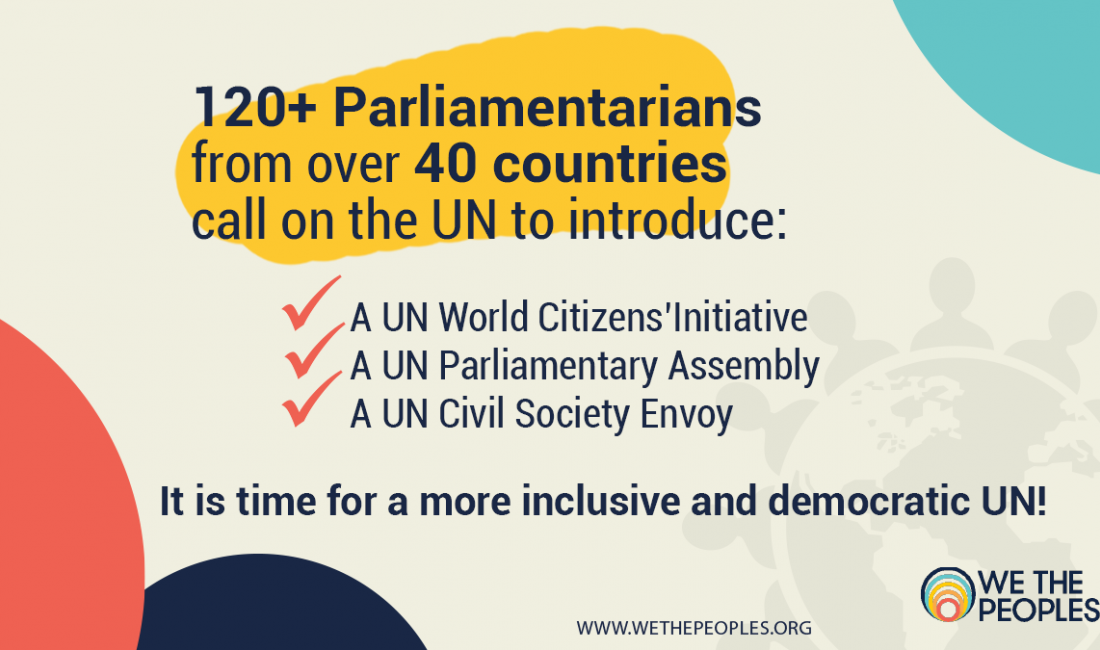Over 120 members of parliament from over 40 countries have lent their support to our ongoing We The Peoples campaign. In a statement released on 26 January 2022, they are backing the call for three institutional changes to the United Nations (UN) to strengthen its democratic and participatory character.
The lawmakers, who hail from all six continents, expressly endorsed the demands of our “We The Peoples” campaign. Together with over 200 civil society organisations, they call for three changes to the UN: a UN World Citizens’ Initiative which enables people to put forward proposals on key issues of global concern; a UN Parliamentary Assembly which includes elected representatives; and a high-level UN Civil Society Envoy to enable greater participation of civil society representatives.
With the statement they lend political support to a global campaign, led by Democracy International, Democracy Without Borders and CVIVCUS dubbed “We The Peoples” in reference to the opening words of the UN’s Charter. The lawmakers’ call follows a report of UN Secretary-General António Guterres titled “Our Common Agenda” which highlighted the need for greater participation and inclusion of various stakeholders in the UN’s work but fell short of recommending institutional changes. According to the lawmakers however, the UN has an essential role to play in tackling current challenges and “current mechanisms (of participation) are not sufficient.” They write that they „strongly believe that the spirit and proposals embodied in these instruments will provide a way forward for the UN to emerge stronger and to allow it to continue to fulfill its invaluable work in the world.“
Strengthening global democracy is a must
Several Members of Parliament provided their personal insights on the need for participatory mechanisms at the UN.
Member of Australian Parliament and signatory of the statement Andrew Leigh had a message for politicians around the world: “Strengthening democracy should be a priority for all parliamentarians. By making international institutions more accessible to citizens, we can strengthen trust and make these organisations more effective.”
“Strengthening global democracy is a must in a globalised world facing major challenges,” said Swiss parliamentarian Nicolas Walder, echoing the campaign’s call that global issues require global solutions that are worked out together with citizens.
South African lawmaker Ashor Sarupen joined the plea by stating: “The UN must reform if it is to remain relevant to the modern world. Voters are increasingly demanding accountability and accessibility. It’s not enough to represent views of states when citizens in those states are divided, or are repressed.”
On the added value of civil society to global governance structures, Member of Parliament Susanne Menge from Germany said: “Involving civil society representatives would help to strengthen partnership-based cooperation against power-political interests and to strengthen social and ecological competence in our world.”
Angela Brown Burke from the Jamaican parliament commented that “people must be placed center stage especially as they are directly affected by the decisions taken by governments” at the UN.
Nik Nazmi Nik Ahmad, a Member of Parliament from Malaysia, said: "Change is deeply needed at the United Nations. I strongly believe that the spirit and proposals embodied in the statement will help the UN to emerge stronger in dealing with existential issues like climate change, poverty, hunger, violence and exclusion."
Jacques Maire, member of the Assemblée Nationale, France joined the call highlighting the importance of a bigger role for citizens in global governance: “Faced with the crisis of democracy, I call upon the United Nations to organise itself to allow a direct expression of the inhabitants of our planet.”
Democracy is a prerequisite to tackle crises
The support of parliamentarians from around the world sends a strong signal that, even in the midst of a global pandemic and the climate crisis, global governance urgently requires a democratic transformation. In the face of these challenges, democratic global governance is not a folly, but an essential step towards tackling crises effectively. They show that there is wide support for measures which would bring ordinary citizens and civil society closer to the UN and global decision-making.
As the joint statement points out, our planet and the 7.8 billion people who live upon it face grave challenges. We urgently require less talk and more decisive action. The 2023 UN “Summit of the Future” proposed by the UN Secretary-General in the Our Common Agenda report presents a unique chance to refocus the UN as the truly inclusive and democratic forum it has always strived to be. It essential now that the process leading up to the Summit is as inclusive and transparent as possible. Special attention should be paid to make sure that all relevant stakeholders, including citizens and civil society, are included both in the preparations and the Summit itself. Only by working together and allowing all affected at the table, humanity has a chance to meet the challenges of the century ahead.
Find the full parliamentary statement and list of signatories here:




